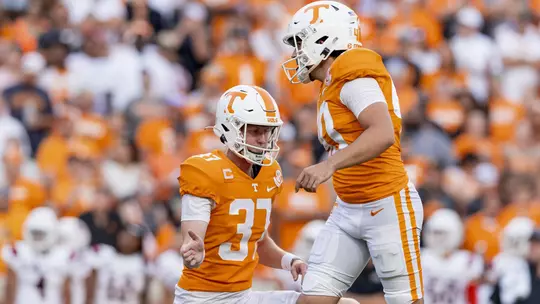
Being Part of Something Special
Gabriel Jackson
It is well known that a good team in general is able to compete on both sides of the ball, offense and defense. Off to the program’s first 6-0 start since the 1998 national championship season, Tennessee has proven that it can compete with any team in the country in those departments.
In football, special teams serve as a unique, but equally important third phase of the game. Special teams can make or break a program and ultimately separate the good from the great.
As noted by General Robert Neyland’s sixth game maxim, “Press the kicking game. Here is where the breaks are made.”
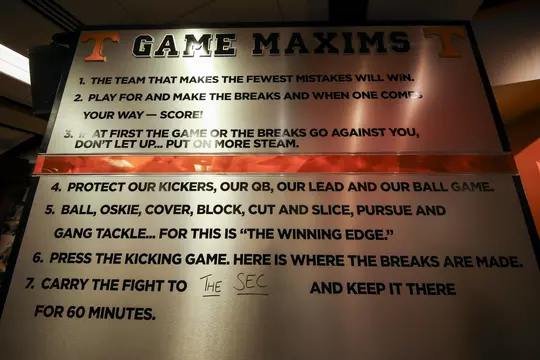
The Vols have no shortage of veteran talent on the special teams unit, and they have been part of some monumental plays this season. Most recently, redshirt senior placekicker Chase McGrath was the hero from Saturday’s 52-49 win against No. 3 Alabama. McGrath converted a 40-yard field goal as time expired to lift the Vols to victory over the Crimson Tide for the first time since 2006.
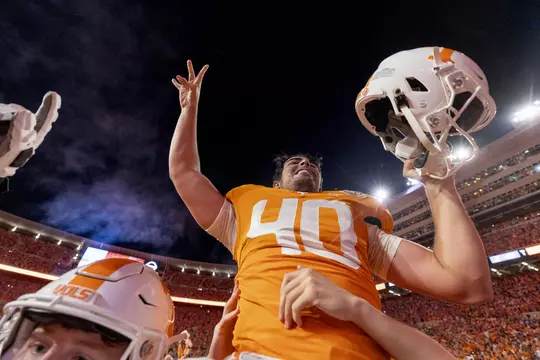
The Newport Beach, California, native earned himself SEC Special Teams Player of the Week honors for the second week in a row after making 4-of-5 fields goals in the Vols’ road win at LSU. From 40 yards and in, McGrath is 16-of-17 for his Tennessee career which includes 10 makes in a row.
“It was a real honor to be named SEC Player of the Week,” McGrath said. “I think it just goes to show how much Paxton, Matty and I put all the work in and the line ahead of me protecting. It’s all the hours, all the snaps, all the kicks that we have done over the spring, summer and leading up to this season. I think it's cool to get recognized for all that work that we put in collectively as a field goal unit.”
Brooks is a veteran specialist in his fifth and final season on Rocky Top. This is his fourth year as the starting punter and kickoff specialist, and his 43.3 yards per punt average in 54 career games ranks third in school history. On kickoffs, he is good for 61.6 yards per kick with 113 of his 199 kickoffs going for touchbacks. Having been with the program for so long, Brooks has become a leader of this team on and off the field. He has been named one of Tennessee’s game captains five times this season and was selected to the 2020-21 VOLeaders Academy.
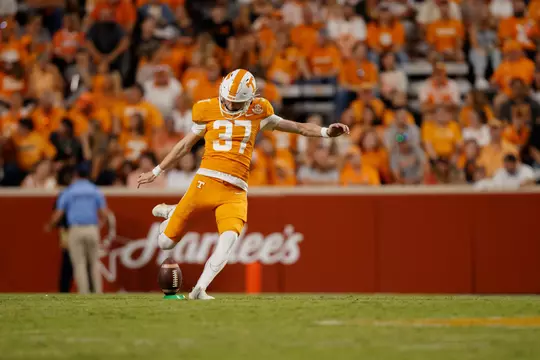
“The importance of special teams these past couple of weeks was something we felt we had a big edge on, just based on what we’ve seen on film and what we’ve been able to do so far this year,” Brooks said. “Our guys do a great job, and I was really glad that a lot of them got some shine. Like Will Brooks getting the recovery against LSU, the guys that fly down there and cover every rep and might not get the recognition that they normally would. When we get to make a big play that turns the game around or helps us have a fast start like it did (at LSU).”
Rounding out UT’s starting specialist trio is redshirt junior long-snapper and East Tennessee native Matthew Salansky. Salansky has been Tennessee’s starting long snapper for the past two years after walking on to the team in 2019. Prior to UT, he was a three-year starter at nearby Morristown West High School.
Salansky comes from a Volunteer family. Both his brother and mother graduated from the University of Tennessee, while his cousin lettered at wide receiver and was a specialist holder for the Vols from 2005-07. He grew up just 45 minutes away and always wanted to play for the Orange and White, and now says the opportunity to play in Neyland in front of sold-out crowds is surreal.
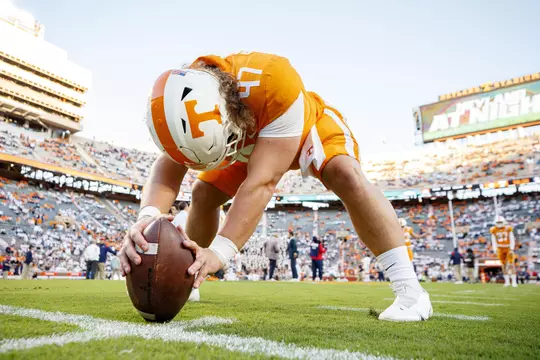
“My cousin played here as a part of the special teams,” Salansky said. “He was a walk-on receiver and he held for PATs and field goals. I grew up watching him and those games and came to Neyland as a little kid, so it’s just something I always wanted to do. There’s just a lot of family tradition here.”
The Volunteers specialists are led by special teams coordinator Mike Ekeler, midway through his second season at Tennessee. Ekeler has come in and ignited the special teams unit to help the Vols become one of the best teams in the country, and the players who have been here have felt his impact on the culture.
“Our specialist room is a tight-knit group,” Brooks said. “We all pride ourselves in trying to be the best in the country and especially in the SEC. I feel like we prepared well. That’s how we are in practice. We have a lot of fun and a lot of camaraderie, but when it comes to game time, we’re locked in. We mesh really well and work off each other, and play off of each other’s energy. It was a huge edge for us this past week and it showed. It starts with our staff, Coach Heupel. our special teams coordinator and everybody on the staff does an amazing job preparation wise.”
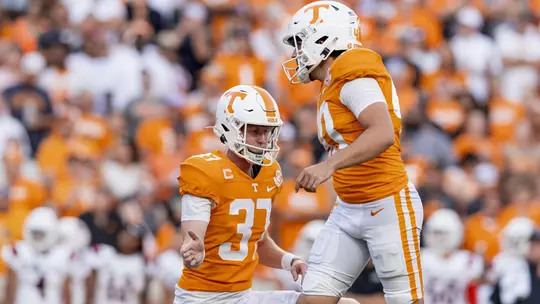
“It’s such a night-and-day difference from where I came in to where the program was before I came,” Salansky said. “Just like where it is now, I never knew if I’d be a part of something like this, and it’s really special to be a part of it and experience it while we’re doing great right now. Coach Ek is an amazing coach and a great guy, but his energy on the field is amazing. It is unmatched by anybody else. He gives his all to it every single day and he never wants to be the weak link as special teams. He always wants to take care of that phase and give the offense great field position. Coach Ek is just awesome.”
McGrath came in last season as a transfer from USC, but he has also felt the effect that the culture change has had on the special teams.
“Our group generally stayed the same (from last year), and we’ve had a few young guys come in that have meshed really well,” McGrath said. “Last year was my first year, and I really didn’t know what to expect—like what the dynamic of the special teams would be like and how I would fit in with everybody. The past year has been amazing. All the guys in my group are some of my closest friends now, and the transition here has been a really fun one.
“It was huge to be able to transition pretty seamlessly with the other specialists. As a kicker, you want to have full confidence and trust in your snapper and holder and I have that in Matty and Paxton. They do an amazing job. We have a great relationship off the field, so we’re able to have that chemistry that when we go into the game and those tough scenarios there’s no question. I have full faith that they're going to do their job, which makes my job really easy because I can just focus on what I need to do.”
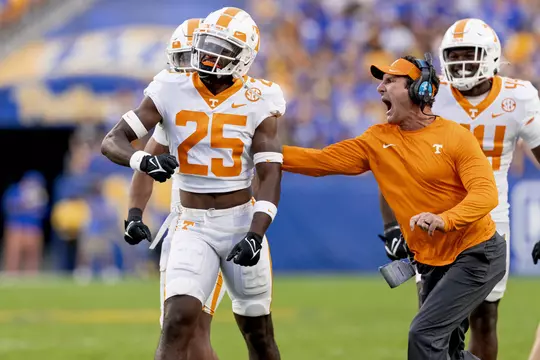
When the special teams come on the field. there is an expectation amongst football fans for them to convert at a near-perfect rate. There is little room for error when it comes to specialists as the punt and return teams set the scene for the offensive and defensive players. The field goal unit allows the team to still come away with points even when the offense fails to score a touchdown and can be the difference between winning or losing.
Brooks, McGrath and Salansky all have to deal with that pressure and all three welcome the challenge.
“Usually during the game, I feel like I am pretty even,” McGrath said. “Not really too high, not really too low. I tend to not get emotional during games. The celebration can happen after the game. That’s how I’ve always approached it, and I really just try to focus on my job and stay as locked in as possible to focus on making the kick.”
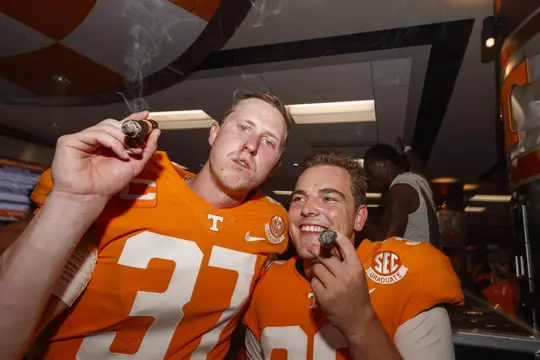
“I think everybody just expects it to happen, but I think Chase, Paxton and I are our harshest critics,” Salansky said. “We’re just as hard on ourselves as anyone else could be. We expect ourselves to be perfect every time. We have the motto one shot, one kill so we just try to live by that and do our job every time.”
“Right now, a lot of our specialists are experienced guys,” Brooks added. “Chase has played a lot of games, I’ve played a lot of games, Matty’s played a lot of games, so all of our guys have experience in different situations. Our specialist room has a lot of older guys that have been through the ringer, so we try to set the tone for everyone around us. They say you can judge a team based on their special teams and how they play, and that shows the difference between a good team and an average team.”
